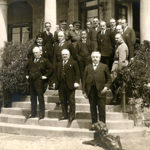Published October 27, 2014
Lewis E. Lehrman, businessman, scholar and protégé of the French economist Jacques Rueff (1896-1978), and I have written about what we called the “reserve currency curse” for about three decades. The salience of that issue has increased sharply with important recent papers and articles by Kenneth Austin, Jared Bernstein, Michael Pettis and Ralph Benko (whose recent summary of the debate was republished in Beijing, Moscow, London and Accra).
In Benko’s article I remarked on what I see as the central issue:
As Kenneth Austin lucidly reminded us, it is a necessity of double-entry bookkeeping that any increase in foreign official dollar reserves equals the increase in combined US current and private capital account deficits. Denying the connection requires magical thinking. The entire decline in the international investment position since 1976 is due to Congress’s borrowing from foreign central banks-that is, the dollar’s official reserve currency role-while the books of private US residents with the rest of the world have remained close to balance.
Lehrman and I have presented the evidence substantiating this relation many times in recent years, including our recent books: Lehrman’s The True Gold Standard and my Redeeming Economics, and related articles.
Professor Paul Krugman recently declared for magical thinking by calling the dollar’s reserve-currency role a “much over-rated phenomenon” and saying he is “not convinced that it’s that big a deal when we try to understand persistent trade deficits.” But Professor Krugman illogically conflates balance of payments deficits in non-reserve countries with those necessarily required by any expansion of official dollar reserves.
In doing so, Professor Krugman seems to recapitulate the debate between Jacques Rueff and John Maynard Keynes, who advocated replacing gold with official foreign exchange reserves in his 1913 book, Indian Currency and Finance, where he argued that whether a central bank holds its reserves in gold or in foreign exchange “is a matter of comparative indifference,” and that “in her Gold-Exchange Standard, . . . India, so far from being anomalous, is in the forefront of monetary progress” heading toward “the ideal currency of the future.” Keynes’ desired system was realized on a global scale, in the Genoa Agreement of 1922, the Bretton Woods agreement of 1944, and now the world paper dollar standard that Austin and others call Bretton Woods II.
Or rather, Professor Krugman would recapitulate Keynes’ controversy with Rueff if he listened as well as Keynes did. Rueff demonstrated in December 1925 that the unprecedented appearance of chronic unemployment in Britain was directly proportional to the rise in the cost of labor, which he traced to the institution of the unemployment “dole,” fixed at so many shillings per week, in the face of a sharp decline in British product prices, thanks to Winston Churchill’s ill-conceived effort to restore the gold value of the pound sterling without adjusting it for the World War I price inflation.
Following Rueff’s lead, researchers found a similar strong relationship in many other countries between the relative price of labor and unemployment—which became known as “Rueff’s Law.” Keynes’s General Theory (1936) depends on Rueff’s Law, plus the assumption that wage rates are fixed in nominal but not real terms.
But the official reserve currencies which Keynes advocated fed the 1920s boom and 1930s deflationary bust in the stock market and commodity prices. Assessing the damage ten years after the Genoa Agreement in a paper entitled “The Case for the Gold Standard,” Rueff pointed out that when a monetary authority accepts dollar or sterling claims for its official reserves, instead of settling its balance of payments deficits in gold, purchasing power “has simply been duplicated, and thus the American market is in a position to buy in Europe, and in the United States, at the same time.” Conversely, extinction of the foreign currency reserves fed the subsequent deflation. A similar cause triggered the Great Recession of 2007-09.
Keynesians who like Professor Krugman engage in magical thinking have never been infrequent. What is new is that they are being joined in growing numbers by Keynesians who don’t.
John D. Mueller is the director of the Economics and Ethics Program at the Ethics and Public Policy Center. He is also the president of LBMC LLC, a firm specializing in economic and financial-market forecasting and economic policy analysis.




